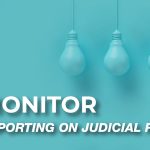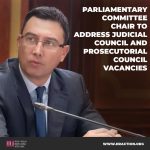
Number 2: Judicial Monitor – Monitoring and Reporting on Judicial Reforms
16/11/2024
N1.T2 – Ninth Attempt to Elect the President of the Supreme Court of Montenegro
20/11/2024N2.T5 – Judicial Council Confronts Politicians, Opens Sessions to the Public
HRA NEWSLETTER 2 – TOPIC 5
Following harsh criticism of judicial decisions coming from high-ranking state officials, including Prime Minister Milojko Spajić and Minister of Internal Affairs Danilo Saranović, as well as representatives of the Democratic Montenegro party, the Judicial Council issued a response on November 8. The NGO Human Rights Action (HRA) had previously urged the Council to act to safeguard the integrity of the judiciary.
In its statement, the Judicial Council affirmed its openness to constructive criticism, emphasizing that such critiques should be well-founded, objective, and substantiated.
“Inappropriate remarks by the Prime Minister, claiming shame over certain court decisions, and the Minister of Internal Affairs, suggesting that courts routinely release criminals from custody, only serve to erode public confidence in the judiciary and undermine its dignity”, the statement noted.
Judiciary members acknowledged the current challenges faced by the Montenegrin judicial system, highlighting that meaningful reforms necessitate the hiring of new judges, filling existing vacancies, and improving working conditions.
“Both the executive and legislative branches must act promptly to enhance spatial, material, normative, and technical conditions to facilitate the efficient operation of the special department”, stated the Judicial Council, which called for a cessation of rhetoric that fosters a negative perception of one of the three equal branches of government.
Nevertheless, this call appears to have been disregarded, as on November 23, Boris Bogdanović, head of the Democratic Montenegro parliamentary club, accused “certain judges” of colluding with criminal organizations, without specifying names or filing formal charges.
“Rather than serving as the pillars of the legal system, certain judges are aligning themselves with criminals. Their decisions prioritize destructive interests over the rule of law”, asserted Bogdanović.
In response, the Association of Judges of Montenegro condemned these accusations, arguing that Democratic Montenegro employs inflammatory language to tarnish judges as members of criminal enterprises.
“We urge Mr. Boris Bogdanović to immediately disclose the names of judges he claims to be complicit in criminal activities, thereby assisting both the Association of Judges and law enforcement in combatting crime”, the Association stated.
The judges also appealed to the Special State Prosecutor’s Office to initiate an investigation based on Bogdanović’s allegations and to question the Democratic Montenegro official in order to present evidence regarding judges purportedly conducting themselves unlawfully.
In response to ongoing concerns, the Judicial Council issued another statement, emphasizing that “politicians fail to recognize the judiciary as an independent branch of power, nor their obligation to refrain from remarks that undermine the independent and impartial functioning of the courts”. The Council urged political actors to “take concrete steps to identify individuals they hold accountable” while refraining from actions that compromise the integrity of all judges. They underscored that judges cannot operate effectively “in an environment where public trust in their work is systematically eroded”.
However, the arbitrary attacks on the Montenegrin judiciary did not end there. In a statement commenting on the prosecution’s decision to indict the president and members of the RTV Montenegro Council due to his election as the Public Service head, Boris Raonić, Director General of Radio and Television of Montenegro, labeled the indictment as absurd. He further alluded to alleged connections between the prosecutors involved in the case and organized crime.
“The prosecutors handling this matter have maintained close ties with organized criminal groups, in a country poised to become an EU member”, Raonić asserted, without specifying any particular state prosecutors.
The Basic State Prosecutor’s Office in Podgorica responded by categorically denying Raonić’s claims. “These unsubstantiated and false assertions suggest that the decision to file an indictment was made under external influence”, stated representatives of the Basic State Prosecutor’s Office. They encouraged Raonić to file a criminal complaint with the Special State Prosecutor’s Office if he believes any prosecutor acted improperly.
Additionally, the Union of State Prosecutors condemned Raonić’s unfounded assessments, asserting that they are aimed at damaging the reputation and integrity of prosecutors.
In the meantime, in the interest of enhancing transparency, the Judicial Council has made the decision to implement more open practices. During the session held on November 8, they reviewed a request from the HRA to audio-visually record and broadcast their sessions and to publish information regarding scheduled meetings and proposed agendas several days in advance.
As a result, the public is now permitted to attend Judicial Council sessions, with the agenda set to be made available two to three days prior to each meeting. However, Council members noted that technical capabilities for recording and broadcasting sessions are not yet in place.
HRA NEWSLETTER 2
- N2.T1 – After four years, the Supreme Court of Montenegro finally has a President: Valentina Pavličić
- N2.T2 – Indictment Control Phase for Tunnel Dug Beneath High Court
- N2.T3 – Judges’ Strike Postponed as Negotiations with Authorities Progress
- N2.T4 – HRA Survey: One-Third of Judges and Prosecutors Perceive Corruption in the Judiciary
- N2.T5 – Judicial Council Confronts Politicians, Opens Sessions to the Public
- N2.T6 – Judicial and Prosecutorial Councils Incomplete; No Response from Political System Committee
- N2.T7 – Who Will Remain to Adjudicate in the Special Department of the High Court in Podgorica?
- N2.BN – BRIEF NEWS





 English
English